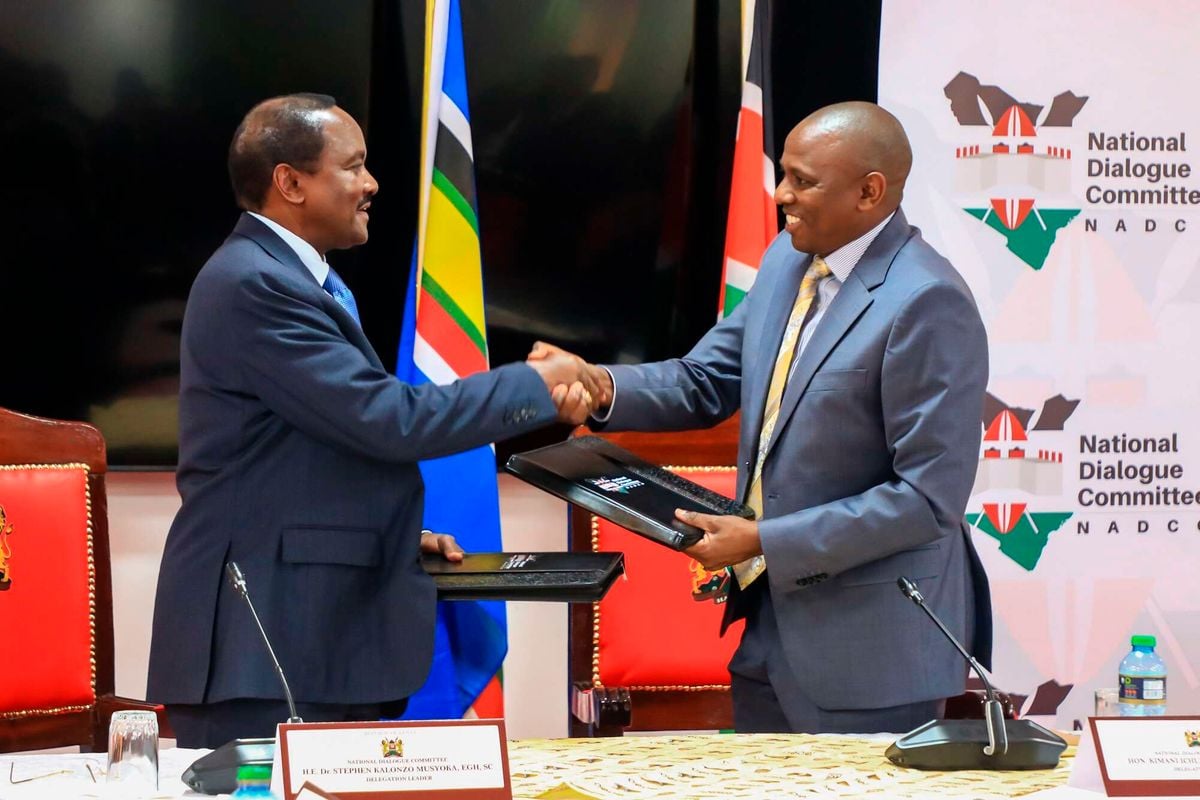The National Dialogue Committee (NADCO) Submitted it’s final report on Saturday with Key recommendations made to President William Ruto and Azimio leader Raila Odinga.
The report was signed by NADCO co-chairs Kalonzo Musyoka of the Azimio Coalition and Kimani Ichung’wah of the Kenya Kwanza Coalition.
Below are the highlights of the 200-page NADCO Report.
On electoral justice and related matters, the committee recommended four major issues.
1. Audit of the 2022 Electoral Process
NADCO recommended the evaluation of the 2022 electoral process which was much pushed by the Azimio camp.
Restructuring and Reconstitution of the IEBC
NADCO has recommended the establishment of an expanded selection panel from the current 7-member to a 9-member selection panel.
The seven-member selection panel was selected by President William Ruto on February 13.
Time for Resolution of Presidential Election Petitions
The committee recommends the increase of timelines within which the Supreme Court shall hear and determine a petition challenging the validity of a presidential election from 14 to 21 days.
Legal Electoral Reforms
NADCO has recommended that legal reforms passed less than 18 months to the general elections become effective in the next electoral cycle.
2. Cost of living
In the report, both camps made proposals on key issues that were part and parcel of the talks in which they disclosed failure to hit a deal on Azimio’s major concerns on taxes, the finance act, and the Housing Levy.
“The committee was unable to reach a consensus on a number of other proposals on the matter of cost of living, including the reduction of VAT on fuel from 16% to 8%, and scrapping of the housing levy, the twin issues in the Finance Act 2023,” the report stated.
The Azimio coalition had argued that the cost of living had hit a record high owing to the new taxes introduced by the Ruto regime.
Despite failing to hammer a deal on taxes, NADCO tabled four key proposals to address the cost of living.
“NADCO recommends that all arms of government shall reduce their travel budgets by 50 per cent and that the Salaries and Remuneration Commission review Daily Subsistence Allowances for State and Public Officers with a view to reducing by 30 per cent,” the first proposal read.
The committee further recommended that the Ministry of Energy and Petroleum in liaison with the national Treasury reduce the road maintenance levy and the anti-adulteration levy by Sh 5 and Sh 3 per liter respectively.
It further proposed that the National Government finalizes the transfer of all devolved functions and provides for the concomitant resources to the county governments.
“NADCO recommends that Parliament shall amend the Constitution to provide for the equitable share to the County Governments not to be less than 20 per cent of all revenue collected by the National Government from the current 15 per cent,” the fourth proposal by the committee read.
The proposal on the cost of living is among five others that were made by the committee and forwarded to Ruto and Raila.
3. Entrenching of funds into the constitution
In the report, the committee recommended the entrenchment of NG-CDF, the National Government Affirmative Action Fund (NGAAF), and the Senate Oversight Fund.
NADCO further recommended the Ward Development Fund be established by statute.
4. Establishment and entrenchment of state offices
The committee recommended the establishment of the Office of the Leader of the official opposition, who is the leader of the largest party/ coalition of political parties that garnered the second-greatest number of votes in the immediately preceding presidential elections with two deputies.
It further recommends the establishment of the Office of Prime Minister to be nominated and upon approval by the National Assembly, appointed by the President.
5 Fidelity to the law on multiparty democracy
NADCO recommends the establishment of the Independent Political Parties Regulatory Commission as an independent body that shall be responsible for the registration of political parties and their office holders and the management of political parties’ funds.
A role currently vested in the Office of the Registrar of Political Parties.
